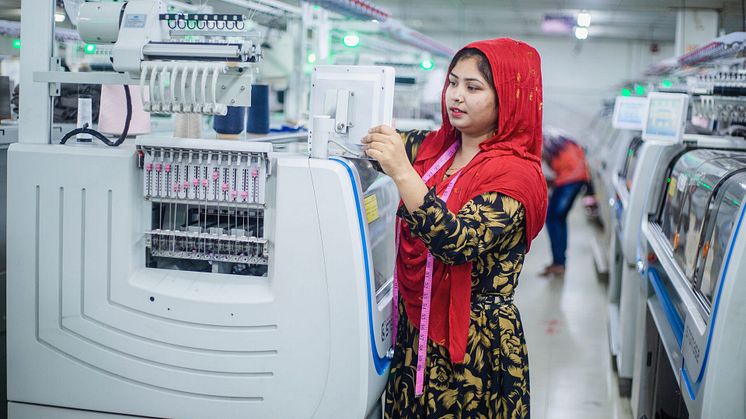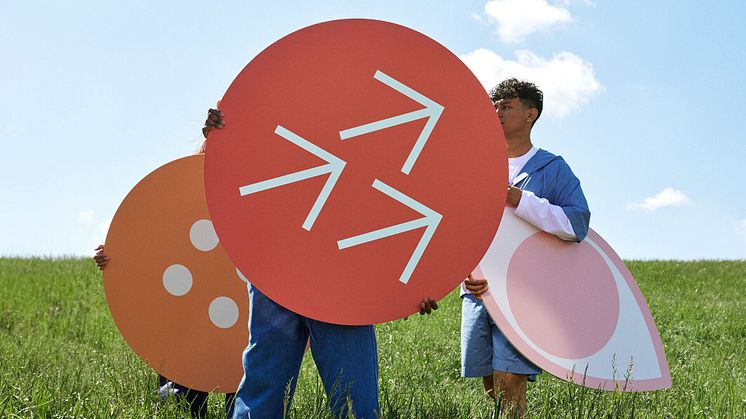
Press release -
H&M Foundation pledges €9 million for just climate transition in Bangladesh
The philanthropic H&M Foundation extends the collective impact initiative Oporajita and pledges approximately €9 million over the next three years to scale just climate transition in Bangladesh’s textile and apparel sector. Oporajita now enters phase two with an expanded focus on decarbonisation, resilience and worker-centred policy advocacy in one of fashion’s most vital manufacturing hubs.
In a deliberate move to embed social equity within fashion’s climate agenda, the H&M Foundation is investing €9 million into phase two of Oporajita – a multi-stakeholder initiative in Bangladesh aimed at empowering women garment workers amid the industry’s shift towards net-zero. Launched in 2022, Oporajita brings together multiple cross-sector organisations, including NGOs, government actors, and startups, to equip women in the ready-made garment (RMG) sector with the skills, networks and resilience needed to thrive in a changing industry.
Despite the turbulence of a global pandemic and political headwinds, the first phase delivered tangible impact. Oporajita empowered 1,416 women to take on future-facing roles in the circular economy, resulting in a 60% job placement rate and an average income increase of 13%. To strengthen leadership, more than 16,000 women received gender-sensitive training, and 60 women workers and community leaders were supported to become change agents within factories and local communities. A further 1,628 out-of-work garment workers were trained in entrepreneurship, with over half successfully launching their own businesses. In addition, Oporajita supported the creation of almost 500 new jobs in the industry and backed 20 startups who run innovations that holistically promote women’s employability, sustainable production, and strengthens industry resilience.
Phase two (2025–2027) raises the bar, shifting focus towards climate adaptation and mitigation through a just transition lens – with women garment workers still at the core. Priorities include:
- Future-proofing factories and workers against climate disruptions: Co-creating practical tools and guidance on climate adaptation and heat stress management, together with factory managers and workers. This includes awareness training, risk assessments, and workplace measures such as hydration support and emergency response.
- Deepening policy impact for a just climate transition: Advancing collective advocacy for policies that support decarbonisation, worker wellbeing and a just transition through policy analysis, stakeholder dialogue, and targeted recommendations.
- Building a climate innovation ecosystem: Supporting startups and innovators to develop circular, low-emission solutions for the RMG sector, while engaging industry leaders in an investment network to scale impact and attract commercial capital.
- Improving agency and wellbeing: Providing climate-resilient WASH facilities, accessible childcare, and parenting support, while building financial and digital literacy. The initiative will also tackle gender-based violence and challenge current norms that limit women’s roles in technology and leadership.

“Through Oporajita, we’re not only responding to automation and climate risk, we’re redefining who gets to lead the response,” said Charlotte Brunnström, Programme Director at the H&M Foundation. “Women workers are often portrayed as vulnerable, but they are also solution-drivers. This phase is about giving them a seat at the table as the industry designs its net-zero future.”
The programme is underpinned by insights from the Just Climate Transitions in Bangladesh report, authored by consulting firm FSG and supported by the H&M Foundation and Laudes Foundation. The report outlines a systems-level framework to align climate goals with social protections in global supply chains - particularly in high-exposure geographies like Bangladesh.
As scrutiny grows around how industry stakeholders decarbonise without deepening inequality, Oporajita offers a model for embedding justice and agency into the transition, grounded in collaboration, innovation and local leadership.
Facts
Project time period: 2025-2027
Financial Support: €9,000,000
Implementing partners: Build Bangladesh, CARE Bangladesh, Center for Communication Action Bangladesh (C-Cab), LightCastle Partners, Save the Children Bangladesh, Swisscontact, WaterAid Bangladesh.
More interventions will be added as more partners sign on during the project time period.
Countries: Bangladesh
Related links
Topics
Categories
The H&M Foundation supports the textile industry’s journey to halve greenhouse gas emissions every decade by 2050, while promoting a just transition for both people and the planet. Funded by the Persson family, the H&M Foundation leverages its philanthropic strengths to drive transformative change, focusing on high-emission areas in the textile value chain. Learn more at hmfoundation.com.





